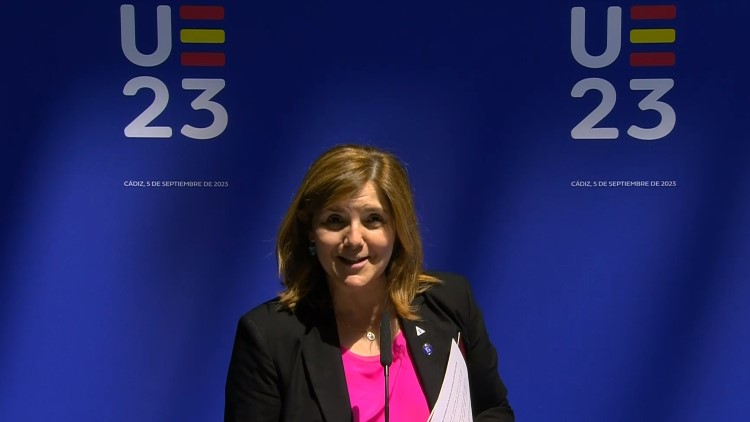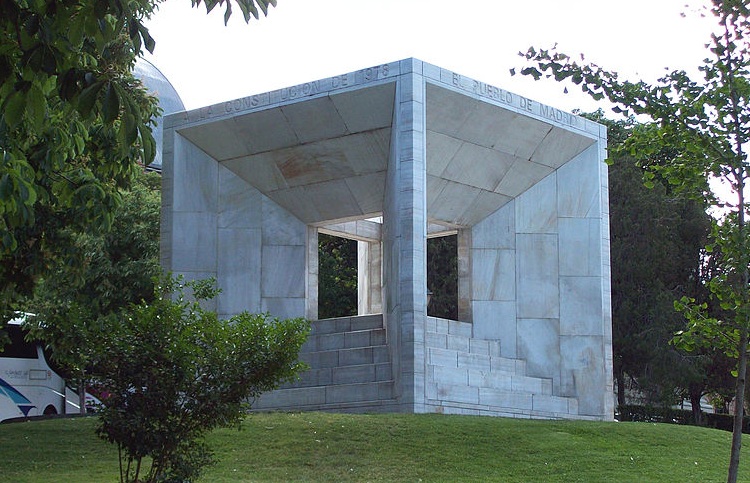Eduardo González
The State Secretary for International Cooperation, Pilar Cancela, said yesterday in Cadiz that the Spanish Presidency of the EU has managed to include the so-called “social leg” among the main priorities of the European Union’s development cooperation, at the same level as the digital transition and the environmental transition.
This is “a very important issue for the Spanish Presidency and, in fact, we have fought hard for it,” said Cancela at the press conference following the informal meeting of ministers of development cooperation of the European Union, held since Monday in Cadiz in the framework of the Spanish Presidency of the EU and chaired by the High Representative of the European Union for Foreign Affairs and Security Policy, Josep Borrell. The Minister of Foreign Affairs, José Manuel Albares, participated in the first day, but delegated Cancela in the second day for “agenda reasons”, according to Ministry sources.
For the Spanish Presidency, according to the State Secretary, “the social aspect, the social leg”, is “fundamental” because it is “very difficult to talk about development and, above all, the digital transition, the ecological, economic or environmental transition, if there is no fundamental support for a social transition”. “It is what we call just transition, social justice,” she added.
In the last few days, she continued, a “very interesting debate” had developed with the intention of “putting the focus on the digital transition and the environmental transition, using the social one as a punctual support”. “Spain understands that, if there is not that preeminence of the social part, we will not be talking about development, we will be talking about something else,” she warned. “Fortunately today (yesterday), in the debate, in the discussion, one of the conclusions and of the great agreements we have reached is that the triple transition is more important than ever because, if not, the other two cannot be achieved,” she added. “We are talking about vulnerable people, those who need it most, and Spain had to make an important bet on this issue,” she added.
Likewise, Cancela explained that, during Monday’s meeting (via videoconference) with the UN Deputy Secretary-General, Amina J. Mohammed, the UN representative asked the EU for “a strong position, a solid position, a univocal position of defense and commitment to the Sustainable Development Goals (SDGs)” during the next SDG Summit, to be held in two weeks in New York, because “the 2030 Agenda has an expiration date” and “all the multi-crises that have been superimposed are making it difficult for certain goals to advance at the speed at which they should be advanced”.
Niger and multilateral development banks
During the Cadiz meeting, which was attended by only two ministers (Belgium and Finland), the Member States defended “the same position” of the EU in the response to the crisis generated by the coup d’état in Niger, because, according to Cancela, although “the decision has been taken to cut contributions in terms of development programs, we cannot disconnect in any way the perspective of humanitarian aid”. For this reason, it is necessary to “adopt a common position of all the EU countries” and avoid that “some take the decision to continue maintaining certain programs, and others none, neither humanitarian aid nor development”.
The other major topic of the meeting, she continued, was the “major financial reform of the multilateral development banks”, such as the World Bank, the Asian Development Bank, the European Bank for Reconstruction and Development, the Inter-American Development Bank Group or the African Development Bank, “which is now one of the major issues on the table and was also proposed at a meeting of the G20”. “The situation in the world has changed, the challenges are ever greater” and, therefore, “it is clear that the multilateral financial organizations have to be prepared to face these new challenges, especially because resources are not infinite, resources are finite and the States do not have sufficient resources to be able to carry out large multilateral projects and attend to these new realities”, she warned.
For this reason, it has been decided that the meeting to be held soon in Santiago de Compostela with the multilateral development banks will not only be attended by ministers of Economy, as initially planned, but that there will also be “a representation of the development leg”. “One of the great battles fought by the Spanish Presidency of the EU is that there should also be representation from the development area because, otherwise, the terms would be much more economicist and we cannot lose sight of the fact that development has to be present in this great reform”, she concluded.






